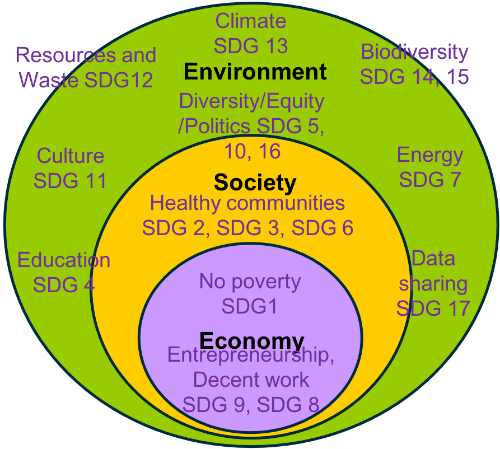Sustainablity

What does sustainability mean to the UK Government and to Durham engineers?
In 2017, the Government launched its Clean Growth Strategy, a blueprint for a low carbon future for the UK. Clean growth means growing our national income while cutting greenhouse gas emissions and is at the heart of the UK’s Industrial Strategy. It is engineers working in conjunction with businesses and communities that convert natural resources into products. And so it is engineers that are an essential part of this Clean Growth Strategy, allowing us to increase our productivity, create good jobs, boost earning power for people right across the country, at the same time as protecting the climate and environment upon which we and future generations depend. This definition of sustainability: “Sustainable development is development that meets the needs of the present without compromising the ability of future generations to meet their own needs” is at the heart of the Government’s Clean Growth Strategy and is summarised in the diagram. But we need to consider not just future generations but current generations too. Resources are not shared equally across the globe and that means global greenhouse gas emissions are not generated equally either. It is the UN's 17 Sustainable Development Goals which ask us to consider both future and current generations. So to summarise:
- The economy is basically the management of resources.
- A sustainable economy operates within the limits of society and within the limits of nature.
- Understanding Economy, Society and Environment needs input from all 4 Faculties working together. Interdisciplinary thinking is needed to achieve the UN’s Sustainable Development Goals.
Understanding Economy, Society and Environment clearly needs input from all 4 Faculties working together. Interdisciplinary thinking is needed to achieve the UN’s Sustainable Development Goals. The importance of sustainability is already clearly stated in Durham’s 10 year strategy (2017-27) -“DU is about world-leading and world changing research that is environmentally sustainable”. There are many definitions of sustainability and sustainable development but all definitions and all organisations working with sustainability values (e.g. the UN, the British Council, Kingfisher Group, Rolls Royce, Siemens, Ørsted) embrace the 3 aspects of sustainability shown in the diagram. ‘The economy sits within society which flourishes within the limits of the environment’.
This more holistic and interdisciplinary definition of sustainability also aligns well with Durham’s USP of world-leading interdisciplinary research and is reflected in our adoption of the UN’s Sustainable Development Goal framework and our signing of the UN's SDG Accord in 2018. The UN’s SDG framework is all about the global challenges faced by both the global south and global north and many are highly relevant to engineers. Many world-leading Engineering firms have also adopted the UN’s 17 Sustainable Development Goals, many of which are highly relevant to engineers, eg SDG7 sustainable energy (Cummins) and SDG6 clean water for all (Kimberley Clark).
The question is not so much why should UK engineers know about sustainability but more that engineers must lead the way in sustainability if the UK is to achieve its Clean Growth Strategy and net zero commitments. Our Institutions demand this. Otherwise other global leaders in engineering will take our place.


/prod01/prodbucket01/media/durham-university/departments-/engineering/74202-5112X1676.jpg)